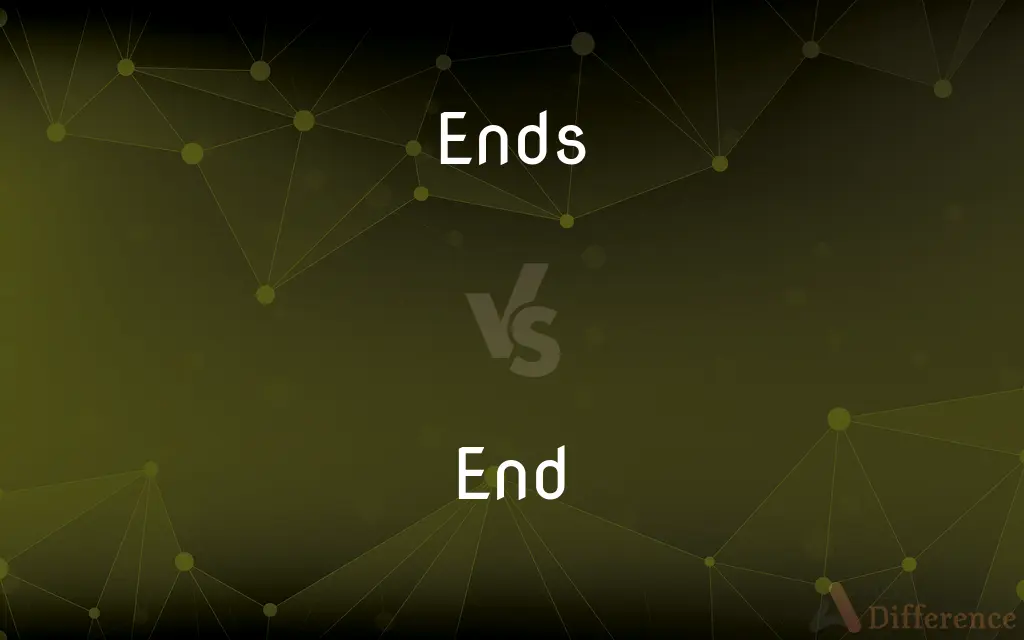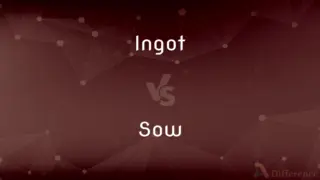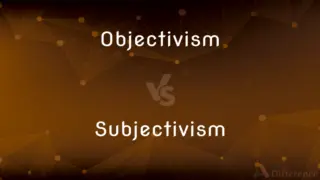Ends vs. End — What's the Difference?
By Fiza Rafique & Maham Liaqat — Updated on April 3, 2024
"Ends" typically refers to multiple final points or goals, focusing on various outcomes or purposes, while "end" signifies a single point of termination or conclusion, emphasizing a singular outcome or finality.

Difference Between Ends and End
Table of Contents
ADVERTISEMENT
Key Differences
"Ends" often implies multiple objectives or results in various contexts, indicating diversity in purpose or conclusion. For instance, in strategic planning, a company might pursue multiple ends to achieve its vision. On the other hand, "end" suggests a singular goal or the conclusion of a specific event or process. This distinction is crucial in understanding the scope and focus of discussions or narratives.
While "ends" can denote the plural of various final parts or points in physical, temporal, or metaphorical spaces, such as the ends of a rope or the ends of an era, "end" refers to a singular point that marks the cessation of an entity or process, like the end of a book or an event. This difference highlights the multiplicity versus singularity of terminations or goals.
In discussions about means and ends, "ends" represents the goals or outcomes one aims to achieve, underlining the multiplicity of possible objectives in ethical or philosophical debates. Conversely, when speaking of "the end justifies the means," "end" focuses on a singular, ultimate goal, demonstrating its importance in decision-making processes.
In literature and storytelling, "ends" might be used to describe various conclusions or fates of characters, emphasizing the diversity of narratives or outcomes within a story. Whereas, "end" could refer to the final moment or climax of a story, underscoring the singular resolution that concludes the narrative.
When used metaphorically, "ends" can signify different aims or purposes individuals or groups might pursue, reflecting the varied motivations that drive actions and decisions. Meanwhile, "end" can symbolize the ultimate purpose or the final point in a journey or endeavor, highlighting a focused or singular aim.
ADVERTISEMENT
Comparison Chart
Definition
Refers to multiple final points or objectives.
Signifies a singular point of termination or conclusion.
Context Usage
Used to indicate diversity in outcomes or purposes.
Used to emphasize a singular outcome or finality.
Philosophical Implication
Often related to the multiplicity of goals in ethical discussions.
Focuses on a singular, ultimate goal in decision-making.
Literary Significance
Can describe various conclusions or fates within a narrative.
Refers to the final moment or climax of a story.
Metaphorical Meaning
Signifies different aims or purposes pursued by individuals or groups.
Symbolizes the ultimate purpose or the final point in an endeavor.
Compare with Definitions
Ends
Conclusions or outcomes.
The debate concluded with both parties achieving their desired ends.
End
The final part of something.
The end of the movie was unexpected.
Ends
Goals or objectives aimed to be achieved.
The organization focuses on sustainable ends in their business model.
End
A termination or conclusion.
The discussion came to an end after two hours.
Ends
Purposes or motives behind actions.
His ends always justify his means, according to his philosophy.
End
The ultimate goal or purpose.
Winning is the end they are striving for.
Ends
The extremities or edges of an object.
The table’s ends are decorated with intricate carvings.
End
A point marking the completion of a process.
At the end of the day, all tasks were completed.
Ends
Final parts or points of something.
She tied the ends of the rope together.
End
The demise or death.
The hero met his end in a dramatic battle.
Ends
Ends is a collection of science fiction stories and poems by American writer Gordon R. Dickson. It was first published by Baen Books in 1988 and as a companion volume to Dickson's Beginnings.
End
Either extremity of something that has length
The end of the pier.
Ends
Either extremity of something that has length
The end of the pier.
End
The outside or extreme edge or physical limit; a boundary
The end of town.
Ends
The outside or extreme edge or physical limit; a boundary
The end of town.
End
The point in time when an action, event, or phenomenon ceases or is completed; the conclusion
The end of the day.
Ends
The point in time when an action, event, or phenomenon ceases or is completed; the conclusion
The end of the day.
End
A result; an outcome.
Ends
A result; an outcome.
End
Something toward which one strives; a goal.
Ends
Something toward which one strives; a goal.
End
The ultimate extent; the very limit
The end of one's patience.
Ends
The ultimate extent; the very limit
The end of one's patience.
End
(Slang) The very best; the ultimate
This pizza's the end.
Ends
(Slang) The very best; the ultimate
This pizza's the end.
End
A remainder; a remnant.
Ends
A remainder; a remnant.
End
A share of a responsibility or obligation
Your end of the bargain.
Ends
A share of a responsibility or obligation
Your end of the bargain.
End
A particular area of responsibility
In charge of the business end of the campaign.
Ends
A particular area of responsibility
In charge of the business end of the campaign.
End
A warp end.
Ends
A warp end.
End
(Football) Either of the players in the outermost position on the line of scrimmage. Offensive ends are eligible to catch passes.
Ends
(Football) Either of the players in the outermost position on the line of scrimmage. Offensive ends are eligible to catch passes.
End
To bring to a conclusion
Let's end this discussion.
Ends
To bring to a conclusion
Let's end this discussion.
End
To form the last or concluding part of
The song that ended the performance.
Ends
To form the last or concluding part of
The song that ended the performance.
End
To destroy
Ended our hopes.
Ends
To destroy
Ended our hopes.
End
To come to a finish; cease
The rain ended.
Ends
To come to a finish; cease
The rain ended.
End
To arrive at a place, situation, or condition as a result of a course of action. Often used with up
He ended up as an adviser to the president. The painting ended up being sold for a million dollars.
Ends
To arrive at a place, situation, or condition as a result of a course of action. Often used with up
He ended up as an adviser to the president. The painting ended up being sold for a million dollars.
End
To die.
Ends
To die.
End
The terminal point of something in space or time.
At the end of the road, turn left.
At the end of the story, the main characters fall in love.
Ends
Plural of end
End
(by extension) The cessation of an effort, activity, state, or motion.
Is there no end to this madness?
Ends
The area in close proximity to one's home; neighbourhood.
End
The most extreme point of an object, especially one that is longer than it is wide.
Hold the string at both ends.
My father always sat at the end of the table nearest the kitchen.
Ends
(slang) Money.
End
Result.
End
A purpose, goal, or aim.
For what end should I toil?
The end of our club is to advance conversation and friendship.
End
(cricket) One of the two parts of the ground used as a descriptive name for half of the ground.
The Pavillion End
End
(American football) The position at the end of either the offensive or defensive line, a tight end, a split end, a defensive end.
End
(curling) A period of play in which each team throws eight rocks, two per player, in alternating fashion.
End
(mathematics) An ideal point of a graph or other complex. See End (graph theory)
End
That which is left; a remnant; a fragment; a scrap.
Odds and ends
End
One of the yarns of the worsted warp in a Brussels carpet.
End
Money.
Don't give them your ends. You jack that shit!
End
To come to an end
Is this movie never going to end?
The lesson will end when the bell rings.
End
(transitive) To finish, terminate.
The referee blew the whistle to end the game.
End
The extreme or last point or part of any material thing considered lengthwise (the extremity of breadth being side); hence, extremity, in general; the concluding part; termination; close; limit; as, the end of a field, line, pole, road; the end of a year, of a discourse; put an end to pain; - opposed to beginning, when used of anything having a first part.
Better is the end of a thing than the beginning thereof.
End
Point beyond which no procession can be made; conclusion; issue; result, whether successful or otherwise; conclusive event; consequence.
My guilt be on my head, and there an end.
O that a man might knowThe end of this day's business ere it come!
End
The object aimed at in any effort considered as the close and effect of exertion; ppurpose; intention; aim; as, to labor for private or public ends.
Losing her, the end of living lose.
When every man is his own end, all things will come to a bad end.
End
That which is left; a remnant; a fragment; a scrap; as, odds and ends.
I clothe my naked villainyWith old odd ends stolen out of holy writ,And seem a saint, when most I play the devil.
End
One of the yarns of the worsted warp in a Brussels carpet.
End
To bring to an end or conclusion; to finish; to close; to terminate; as, to end a speech.
On the seventh day God ended his work.
End
To form or be at the end of; as, the letter k ends the word back.
End
To come to the ultimate point; to be finished; to come to a close; to cease; to terminate; as, a voyage ends; life ends; winter ends.
End
Either extremity of something that has length;
The end of the pier
She knotted the end of the thread
They rode to the end of the line
End
The point in time at which something ends;
The end of the year
The ending of warranty period
The middle of the war
Rain during the middle of April
End
The concluding parts of an event or occurrence;
The end was exciting
I had to miss the last of the movie
End
The state of affairs that a plan is intended to achieve and that (when achieved) terminates behavior intended to achieve it;
The ends justify the means
End
A final part or section;
We have given it at the end of the section since it involves the calculus
Start at the beginning and go on until you come to the end
A whole is that which has beginning, middle, and end
End
A final state;
He came to a bad end
The so-called glorious experiment came to an inglorious end
End
The surface at either extremity of a three-dimensional object;
One end of the box was marked `This side up'
End
(football) the person who plays at one end of the line of scrimmage;
The end managed to hold onto the pass
End
One of two places from which people are communicating to each other;
The phone rang at the other end
Both ends wrote at the same time
End
A boundary marking the extremities of something;
The end of town
End
The part you are expected to play;
He held up his end
End
The last section of a communication;
In conclusion I want to say...
End
A piece of cloth that is left over after the rest has been used or sold
End
A position on the line of scrimmage;
No one wanted to play end
End
Have an end, in a temporal, spatial, or quantitative sense; either spatial or metaphorical;
The bronchioles terminate in a capillary bed
Your rights stop where you infringe upon the rights of other
My property ends by the bushes
The symphony ends in a pianissimo
End
Bring to an end or halt;
She ended their friendship when she found out that he had once been convicted of a crime
The attack on Poland terminated the relatively peaceful period after WWI
The U.S. started a war in the Middle East
The Iraqis began hostilities
Begin a new chapter in your life
End
Be the end of; be the last or concluding part of;
This sad scene ended the movie
End
Put an end to;
The terrible news ended our hopes that he had survived
Common Curiosities
How do "ends" influence decision-making?
"Ends" influence decision-making by presenting multiple goals or outcomes to be considered.
Is "end" always negative?
No, "end" can be neutral or positive, depending on the context, such as the completion of a goal or the conclusion of a journey.
What is the difference between "ends" and "end"?
"Ends" refers to multiple objectives or conclusions, whereas "end" signifies a singular point of termination or goal.
How do "ends" relate to ethics?
In ethics, "ends" often refer to the goals or outcomes that ethical actions aim to achieve, highlighting the importance of considering multiple objectives.
Are "ends" always tangible?
No, "ends" can be intangible, such as goals, outcomes, or purposes, not just physical points or parts.
What does "the end justifies the means" mean?
It suggests that achieving a singular, ultimate goal ("end") can justify the methods used, regardless of their nature.
Can there be multiple "ends" in a story?
Yes, stories can have multiple "ends" when referring to the various outcomes or fates of characters and subplots.
Does the "end" of a book always mean its conclusion?
Yes, the "end" of a book typically refers to its final part or conclusion, wrapping up the narrative.
Can "end" refer to a pause rather than a complete stop?
Generally, "end" signifies a complete stop or conclusion, rather than a temporary pause.
Can "ends" and "end" be used interchangeably?
They cannot be used interchangeably due to their difference in implying multiplicity versus singularity.
How does the concept of "end" relate to time?
"End" can signify the conclusion of a period, such as the end of an era, marking a specific point in time.
What is meant by "meeting one’s end"?
It typically refers to someone’s death or the conclusion of their life or career.
What does it mean for "ends" to justify the means?
It means the goals or outcomes desired ("ends") are considered more important than the methods used to achieve them.
How do "ends" affect strategic planning?
In strategic planning, "ends" represent the objectives or goals a strategy aims to achieve, guiding decision-making processes.
Is the "end" of a movie always the climax?
The "end" of a movie refers to its final scene or conclusion, which may or may not coincide with the climax, depending on the narrative structure.
Share Your Discovery

Previous Comparison
Ingot vs. Sow
Next Comparison
Objectivism vs. SubjectivismAuthor Spotlight
Written by
Fiza RafiqueFiza Rafique is a skilled content writer at AskDifference.com, where she meticulously refines and enhances written pieces. Drawing from her vast editorial expertise, Fiza ensures clarity, accuracy, and precision in every article. Passionate about language, she continually seeks to elevate the quality of content for readers worldwide.
Co-written by
Maham Liaqat















































